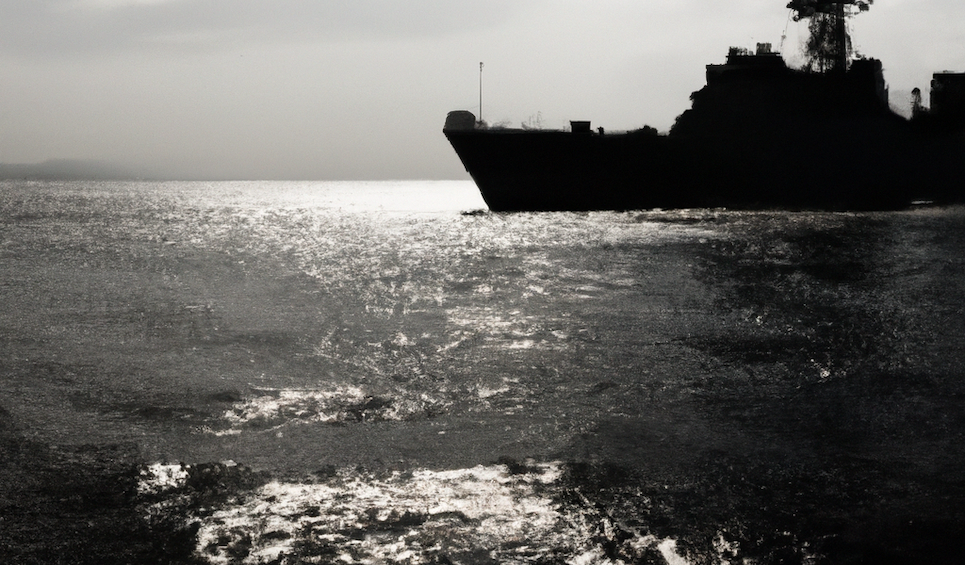The disputed existence and legal implications of an unwritten, unpublicised “gentleman’s agreement” between Chinese authorities and former Philippine president Rodrigo Duterte regarding the rusting wreck of a WWII-era naval vessel has emerged as the latest flashpoint in the long-standing maritime tensions between the two countries.
The boat in question, BRP Sierra Madre, was intentionally grounded in the Ayungin (Second Thomas) Shoal as a response to China’s occupation of the nearby Mischief Reef in 1995. The Sierra Madre’s continued presence in Ayungin Shoal, alongside with that of the Philippine Navy personnel based on it, is critical to the Philippines’ assertion of its sovereign rights. Already in a state of decay and disrepair at the time of being scuttled, if the construction materials needed to repair the Sierra Madre cannot be transported, the few naval officers stationed there would have to abandon the vessel altogether. This would thus end the Philippine presence in Ayungin Shoal and inevitably lead to drastic military and political consequences tilted in China’s favour.
The Philippine Navy’s recent efforts to transport materials for the Sierra Madre’s repair—thereby disturbing the “status quo”, as official Chinese rhetoric has it—has been at the centre of an escalating diplomatic crisis between Manila and Beijing. Tensions were raised when the Chinese side raised a “gentleman’s agreement” that they claim contained the Duterte administration’s commitment to maintain the “status quo” regarding the Sierra Madre. President Ferdinand Marcos, Jr. has since expressed that he has rescinded any agreement, if it ever existed.
On 7 May, Chinese officials relayed to international media the existence of its “smoking gun” on the matter, saying that they would release the transcript of a recorded call with a Philippine general supposedly affirming the agreements made in connection to Ayungin Shoal. Philippine Navy and Armed Forces spokespersons refused to directly engagement with the issue, calling the claim “questionable” and “zombie stories” to be disregarded.
Even as the materiality of the gentleman’s agreement remains unsubstantiated, what is unfolding in real time is a political intrigue over a phantasm, supposedly as real as any other formal source of international obligations. The general sense of haziness surrounding China’s approach towards this issue—that is, alluding to indeterminate and vague deals—falls within its patterns of practice in the international plane. As China’s power and influence grows, it has been in a position to reshape modes of state relations and international norms—possibly including legal norms. The implications for international legal practice cannot be understated, particularly how China’s actions can very well challenge modern international law’s claims of universality and the stability of the recognised sources of international law.
Beyond the black letter of international law
The tactics deployed by China are always situated in wider discussions as a foil to the Philippines’ approach of invoking international law,. The administration of former president Benigno S. Aquino III instituted the proceedings in The Hague-based Permanent Court of Arbitration, issuing an Award largely in Manila’s favour. China refused to acknowledge or take part in the legal proceedings.
Undeniably, there is a striking contrast between the Philippines’ approach of invocation of and reliance on international law and that of China’s non-participation in the arbitration. Yet these opposite positions cannot be merely reduced to a one-dimensional analysis of fundamental differences in political values between the two states. It is also not enough to look at the issue, as others have done, from the insular lens of treaty law or domestic criminal law. A Philippine-based legal academic, for instance, confined the legal implications of the gentleman’s agreement to its possible consequence for Philippine public officials who may enter into such unwritten, unpublicised international agreements. Similarly, the Philippine House of Representatives launched an inquiry aimed at making sense of the policy decisions behind the gentleman’s agreement and seeking clarity on its legal implications for the Philippines. During this probe a legal expert from the Department of Justice described the agreement as an “oral treaty”—though in principle, something as unwritten and unpublished more properly belongs to a larger class of international agreements not governed by the Vienna Convention on the Law of Treaties (VCLT).
Speculation and opinions of practitioners anchored solely on the force and effect of the gentleman’s agreement and what liabilities may arise from it might be obscuring the larger picture. If anything, this recent debacle warrants a further examination of the significant movements in political and legal attitudes in the region and worldwide. Thus, a more attentive, careful approach should consider the following: first, what sizeable shifts have occurred in the use and practice of international law at large; and second, China’s own unique contribution to these very shifts.
Informal international law?
The post-World War II international legal order dominated by the United States and its allies emphasises the rule of law through multilateral institutions and, with it, the universal quality of international law itself. Together, these principles advance the values of predictability, stability, and compliance with international law, in a world where the primary challenge has always been the absence of a central law-making and law enforcement body. Among China’s counterpoints to this established order is an emerging illiberal rationality held together by among other things what Darren Lim and John Ikenberry call a “logic of difference” in which preference is given to agreements “unconstrained by formal rules and institutions.”
The gentleman’s agreement is plainly one such compact. As a kind of alternative international relations strategy banking on the “co-optation of key elites” China’s emphasis on informal, bilateral arrangements fell in synch with former president Duterte’s distinct authoritarian political project. Duterte’s firebrand populist authoritarianism included, among others, distancing the Philippines from the United States in terms of foreign policy. Underlying this attempt at dissociating was, at the very least, an implicit questioning of core liberal values.
Forgetting the Battle of Manila
Why does one of the Philippines’ most traumatic wartime experiences loom small in commemorations of WW2?
The idea of “dark law” that describes the web of “legislative–judicial–political relations that erode legal protections and empower legalistic autocrats” squarely finds relevance here. Authoritarian regimes like China’s rely on the margin afforded by both the dynamic process of international lawmaking and the tendency of the language of international law to be in broad strokes. Playing into the lack of transparency and indeterminacy of the contents of gentlemen’s agreements, for instance, is a way out of accountability and compliance with recognised international legal norms.
Oral agreements are already rare in the modern practice of states, considering the definition fixed by the VCLT: that treaties are those international agreements “concluded between States in written form and governed by international law.” Alongside this definition is the obligation stated in Article 102 of the UN Charter, that every treaty and international agreement entered into by UN member states shall be registered with and published by the UN Secretariat. Nevertheless, international agreements not falling within the VCLT’s definition are still governed by general international law in terms of assessing their binding force.
The written form, registration, and publicity requirements of treaties that are found in the VCLT and UN Charter pre-empt instability in the international plane, especially as states constitute a horizontal, pluralistic system. These seemingly “mere” formal requirements serve a normative purpose as well: they provide a framework for international lawmaking that approximates the idea of regular compliance with procedure found in the domestic sphere. Predictability and legality are intangible legal goods highly valued in a democratic system as they are sources of a legal rule’s legitimacy.
For China, insisting on the legal efficacy of the gentleman’s agreement may very well be a validation of its lingering narrative regarding the Chinese practice of international law, including its state behaviour towards treaty practice. Some Chinese legal scholars have positioned the Chinese approach to international law against the backdrop of China’s historical experience in international politics, resisting Western incursions.
In this vein, China’s contemporary practice may thus be an attempt to reshape international law, together with its Eurocentric, Westphalian fundamental assumptions and values. Other scholars point to the utility of oral agreements in China’s own practice. In asserting the validity of these oral agreements, China looks to rules other than the VCLT, including its own domestic law, the “circumstances of conclusion” of the agreement and other tacit factors.
Still, China’s marked deviation from international norms on substantive areas like the law of the sea and human rights are still within the matrix of international law—not totally abandoning it, but instead employing its language and mechanisms to confer a semblance of legitimacy on its actions.
On Philippines’s part, the staunch denial of the existence of the gentleman’s agreement should not obscure the circumstances that gave rise to the thorny issue in the first place. It can now be reasonably said in retrospect that the Philippines’ conforming attitude to traditional international law—seen in its recourse to the PCA and vocal appeal to the rules-based order—was disrupted by the swift current of its own authoritarian resurgence since the election of Rodrigo Duterte to the presidency in 2016.
It is important to recall that Duterte’s term was marked by autocratic tendencies, observed widely as evidence of global democratic backsliding. Former Philippine Supreme Court Justice Antonio Carpio expressed that in entering into the gentleman’s agreement, former President Duterte effectively exceeded his authority, therefore acting against the Philippines’ interests. Duterte’s rule exactly featured an attitude of excess in the exercise of state power, resulting to massive violations of human rights during its peak.
The appeal of ambiguous, clandestine arrangements to an authoritarian leader makes perfect sense; one can bypass the normal course of democratic deliberation central to policymaking and, in turn, extinguish any opportunity for future accountability.
International law and the reality of power
At face value, the actions taken by the Marcos administration may prompt the immediate observation that there is an attempt to restore the Philippines’ compliance with international law. However, a cautious assessment may be a wiser approach. We can condemn the previous undermining of sovereignty and national interest, but still be prudent in locating present foreign policy politics within the regional and global dynamics of power.
Domestic politics figure in as well, especially since a very public rift with the Dutertes might be instrumental in driving Marcos to make forceful condemnations of the previous administration’s policy choices in the South China Sea. Parenthetically, Marcos has been ambivalent towards his own administration’s stance on the International Criminal Court’s investigation on the Philippines—another highly-charged issue concerning the application of international law. In other words, there is no certainty that the current administration’s performance of conformity with international order will truly result in democratic gains.
The alarm bells sounding on the rise of authoritarian international law should also not be taken as a blank cheque to descend into an uncritical defence of international law in its totality, including its gaps, silences, and hierarchies. For instance, on the matter of the treaty-based defence arrangements between the United States and the Philippines, Melissa Loja and Romel Bagares recently warned against a total surrender of faith to the perceived US commitment to the Philippines’ defence by pointing out the ambiguity built into American statements of support.
International law for more politically insecure states presents a limited remedial purpose, rather than providing a broad, empowering framework. The most recent episode in the South China Sea serves as a stark reminder of how states like the Philippines, wedged between competing hegemons and major economic powers, find themselves delicately navigating an international legal system that does not always primarily promote their national interest.
 Facebook
Facebook  Twitter
Twitter  Soundcloud
Soundcloud  Youtube
Youtube  Rss
Rss 



